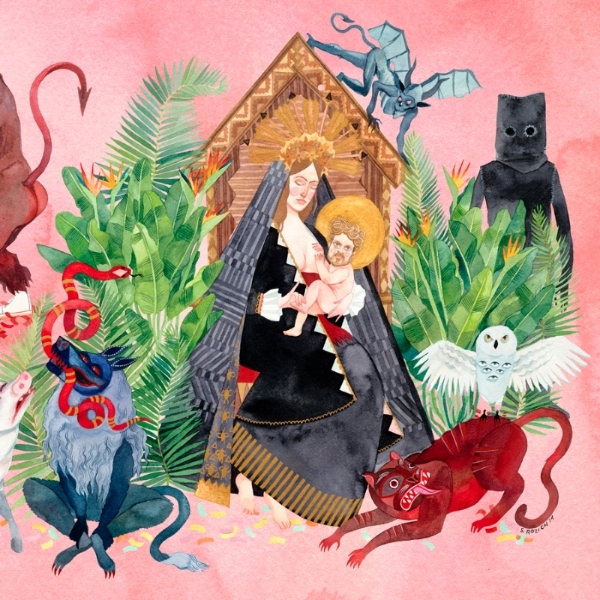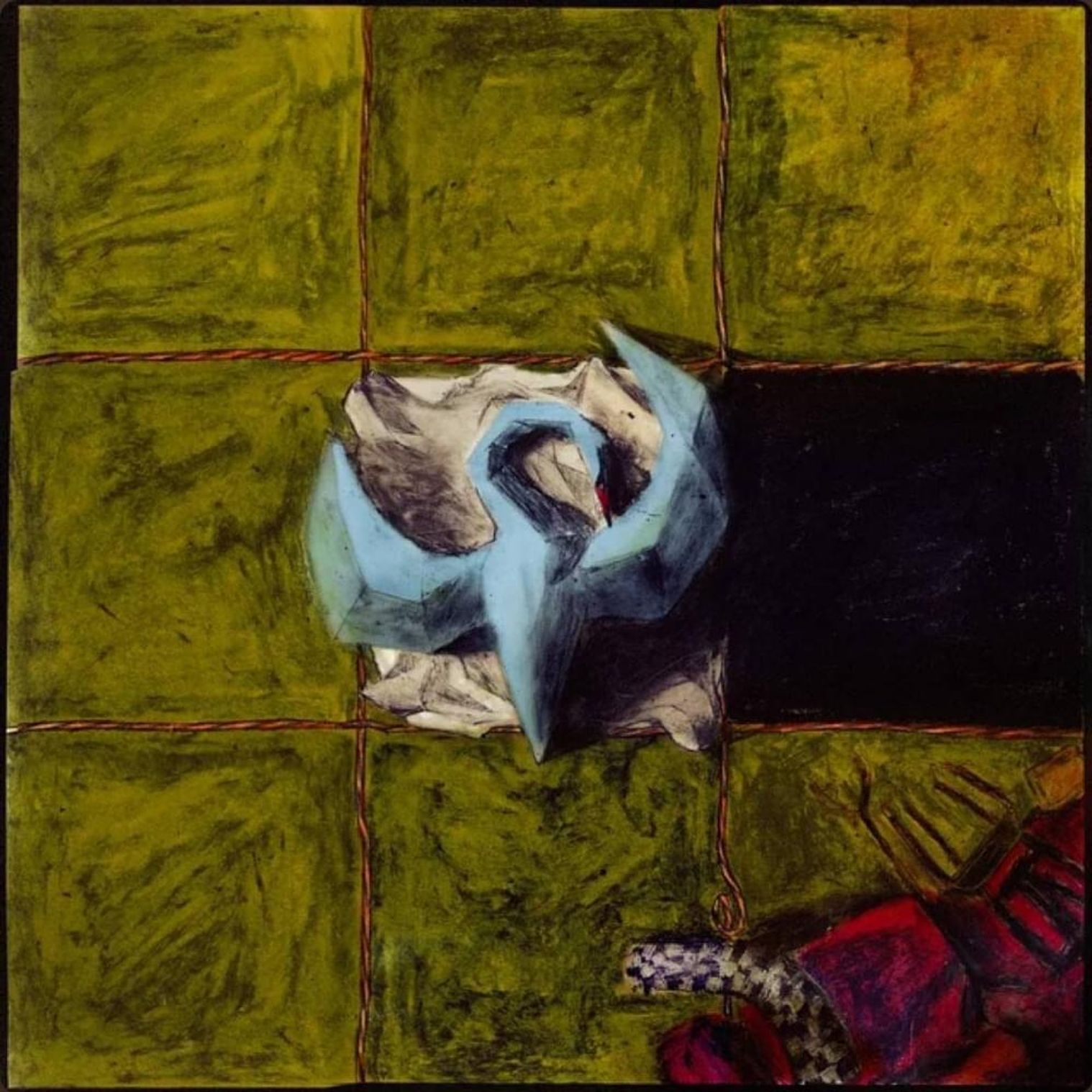Father John Misty left a successful band and invented a whole new persona just so he could get away from the idea of cliche. And then he fell in love, the biggest cliche of all. FJM is, of course, Josh Tillman, a young man who escaped a fundamentalist Christian upbringing in suburban Maryland to spend his '20s working low-paying jobs and releasing sincere, downtrodden folk album after sincere, downtrodden folk album. Somewhere in there, he joined Fleet Foxes as the band's drummer. For a moment, he felt like he was saved. But then he began to feel like he was doing just another mechanical job and not being true to himself. So he split from the band, moved to Laurel Canyon by himself and reinvented himself as a louche, slithering Leisure Suit Larry take on the '70s singer-songwriter archetype. There was a psychedelic-shaman element to all of this; all the (very good) FJM profiles this week have noted that he came up with the idea for his artistic rebirth while on an ayahuasca trip. But the motivating force behind FJM's 2012 re-debut album Fear Fun -- or the one that lingered with me the most, anyway -- was the acidic self-awareness of it all. He couldn't just be a man with an acoustic guitar expressing himself; he had to sneer at the entire institution of men with acoustic guitars expressing themselves: "I'm writing a novel because it's never been done before." But around the same time he made Fear Fun, Tillman met a woman named Emma in the parking lot of a hippie-ish Laurel Canyon grocery store. They got married. And now he's left with the question of how to address something as life-changing as the act of falling in love -- something that's been so corrupted by hack songwriting -- and make that experience feel vivid and alive and new. Somehow, he did it. I Love You, Honeybear is an uncomfortable wriggle of an album, one packed with sardonic doublespeak and bad faith. But it's also a deeply felt, beautifully realized piece of work about what happens when two people build a life together.
So: I Love You, Honeybear is an album about falling in love, but it's also an album about how lame and predictable it is to make an album about falling in love. That self-suspicion radiates from every single aspect of the record, right down to the title. "Honeybear" is a pet name that Tillman and his wife have reportedly never, ever used with each other. It's a made-up and purposefully vacuous, and yet Tillman sings the word "Honeybear" with what sounds like real feeling. Like the Magnetic Fields on 69 Love Songs, he fakes that cliche so real it is beyond fake. The first song on the album is also the title track, and after Tillman gets done tenderly cooing that pet name, this is the first lyric he offers: "Mascara, blood, ash, and cum / On the Rorschach sheets where we make love." That's about as concrete and physical and descriptive as you can get, and Tillman doesn't let up from there.
Part of the magic of the album is the way Tillman dives into the difficult things about falling in love -- the misgivings, the jealousy, the creeping feeling that you do not deserve any of this bliss -- with as much relish as he uses for the great stuff. "The Night Josh Tillman Came To Our Apt" isn't a love song; it's a loath song, about all the little petty details that you find yourself hating, and then hating yourself for hating: "She says, 'Like, literally, music is the air [she] breathe[s] / And the malaprops make me want to fucking scream / I wonder if she even knows what that word means / Well, it's 'literally' not that." (Punctuation decisions are Tillman's own, via the lyric sheet.) "Nothing Good Ever Happens At The Goddam Thirsty Crow" ends with Tillman happily and cruelly rebuffing women who come on to him at a bar, and it ends with him worrying over whether his wife is doing the same when he's away on tour. "The Ideal Husband" is constructed as a song about Tillman's anxiety that his "files" will become public knowledge, but it's really just a list of reasons why he finds himself unworthy, why he's not sure he'll make a good husband: "Telling people jokes to shut them up / Resenting people that I loved." And sometimes his worries go beyond just himself; first single "Bored In The USA" is a maybe-too-broad catalog of reasons why modern life is bullshit, why our collective everyday concerns are petty enough that they're choking the capacity for love right out of us. Just the way Tillman reads the line "the golden era of TV" on "Holy Shit" is as withering as anything, say, Jello Biafra ever did.
All of this is bleakly funny. Tillman, as you can tell from those excerpted lyrics, is one hell of a writer, bitter and descriptive and mean and unflinching. He's also entirely willing to come across as a miserable asshole, which makes the wide-open parts feel more genuine. And when Tillman does sing about a moment of no-joke personal connection, it can be enough to just level you. "I Went To The Store One Day" is the song that ends the album, and it's a soft and pretty and almost unguarded reverie about the moment he met his wife in that grocery-store parking lot. The song means more because it comes after all this darkness and defensiveness and irony: "For love to find us of all people / I never thought it'd be so simple." He imagines a future: Seven daughters, dying of a heart attack during their last fuck. (There's a lot of talk about fucking on the album in general, which is sort of refreshing when you consider how often that very important aspect gets glossed over in musical love-narratives.) But even here, Tillman isn't quite ready to let go of his cleverness, his willingness to overthink everything to death. Actual lyric: "[Insert here: / A sentiment re: Our Golden Years]." (Again, all punctuation is Tillman's. And the lyric sheet, including Tillman's list of instructions on how to hear every song on the album, is reason enough to pay money for I Love You, Honeybear.) But even with all the overthinking, Tillman knows to end things by pulling all that back, offering just an acoustic guitar and his voice for the last few lines: "All 'cause I went to the store one day / 'I've seen you around / What's your name?'."
So I Love You, Honeybear is an elegantly written album with a lovely and complicated narrative, but that would mean jack squat if Tillman didn't find compelling ways to put all this to music. He does. Does he ever. I Love You, Honeybear is, on the surface level, an absolutely gorgeous album, and I suspect that plenty of people are going to enjoy it without even digging into the lyrics. Tillman started messing around with California folk-rock history on Fear Fun, and he goes deeper here. His songs are layered and confident and recorded with ridiculous pristine clarity. The songs burst with strings and woodwinds and psych-rock guitars and pianos and organs, all of them arranged in ways that delight in grandeur without ever looking at that grandeur as an end in itself. And Tillman has also grown as a pure singer, to the point where I'd trust him to belt out a torch song during the opening credits of a Bond movie. He's got a sort of white-soul-singer virtuosity, and he can hit big high notes, and draw them out, without drawing flashing signs that point to every big note. Even in the quiet moments, he finds ways to shine. "Born In The USA" half-quotes Donny Hathaway's "A Song For You" in its first line, and Tillman pulls it off, which cannot be easy. In Sean Fennessey's Grantland profile of Tillman, Tillman says, "Emma, at one point, said to me, 'You just can't be afraid to let these songs be beautiful.' And that was, to me, [when] I realized that the album was a different beast and it had to be approached differently." He figured out that puzzle. He made something beautiful.
That's the real amazing thing about I Love You, Honeybear: It achieves beauty without ever forgetting the complications that come with that beauty. Tillman can sing about sex and anxiety and death-fear with sweeping cinematic panache. He can make low feelings sound high, and he can make high feelings sound like grand romantic visions. Here's his idea of a profession of love, from "Chateau Lobby #4 [In C For Two Virgins]": "I haven't hated / All the same things as somebody else / Since I remember / What's going on for, uh, what are you doing with your whole life / How about forever?" There are plenty of warts there, but he sells that line, and its sentiment, like he's falling to his knees with a rose clamped between his teeth. He's done amazing things on this album. I can't wait until he makes a record about fatherhood.
I Love You, Honeybear is out now on Sub Pop. Stream it below.
[videoembed size="full_width" alignment="center"][/videoembed]
[videoembed size="full_width" alignment="center"][/videoembed]
Other albums of note out today:
• The soundtrack to NOFX frontman Fat Mike's Broadway-style punk rock musical Home Street Home.
• Trust Fund's joyously rickety indie-pop debut No One's Coming For Us.
• Quarterbacks' jittery-but-thoughtful self-titled debut.
• Thurston Moore improv project Caught On Tape's relatively digestible Full Bleed.
• Rone's atmospheric genre-free meditation Creatures.
• Leapling's nervy DIY debut Vacant Page.
• Sally Shapiro producer Johan Agebjörn's Italo-disco blissout Notes.
• Blind Guardian's power-metal roar Beyond The Red Mirror.
• North Highlands' post-breakup self-titled album.
• The Weeknd-featuring Fifty Shades Of Grey soundtrack.
• Ex-Cult's Cigarette Machine EP.
• Dan Lissvik's Shuvit! EP.
• Never Young's self-titled EP.
• Blis.'s Starting Fires In My Parents' House EP.






